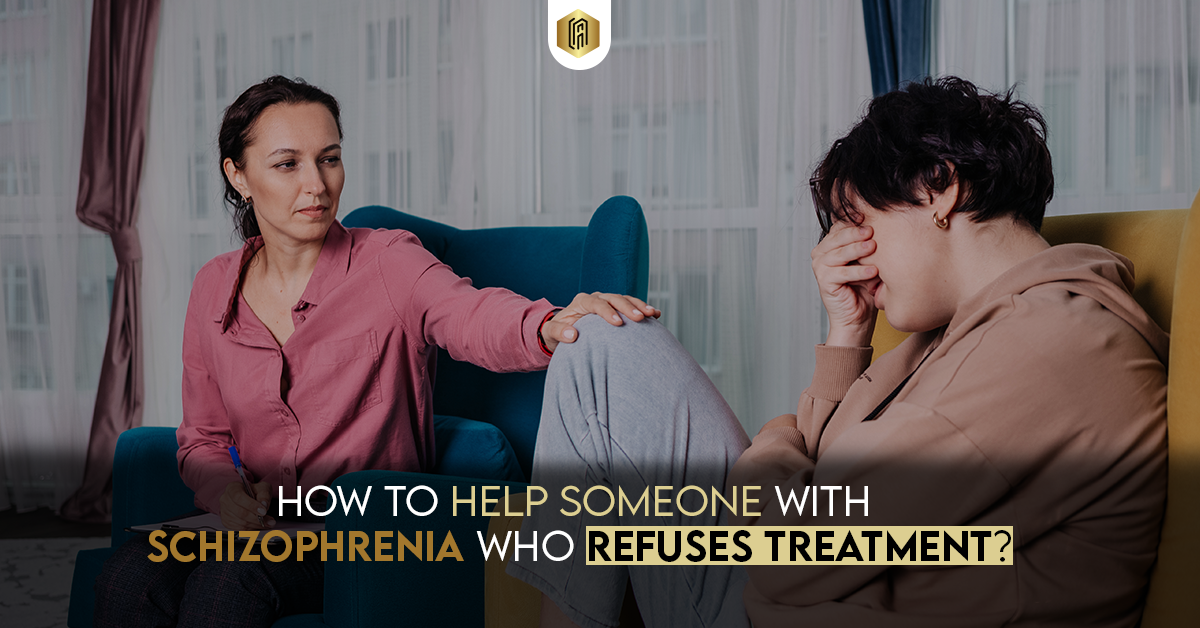Living with someone who has untreated schizophrenia is difficult. This mental disorder changes how they see and feel about the world. Schizophrenic patients often feel they don’t need help from anyone. In this case, they are almost isolated and not willing to accept help. However, it’s tough but possible to learn how to help someone with schizophrenia who refuses treatment?
We will explain schizophrenia. We will share simple ways to help someone with it who refuses treatment. You’ll learn to talk to them. Understand their feelings. Encourage healthy choices without forcing them.
Are you struggling to help a loved one with untreated schizophrenia? Ascension Psychiatric Services provides expert care to support their recovery. Contact us today.
What Is Schizophrenia?
Schizophrenia is a complicated mental illness. It distorts reality for those affected. People facing this challenge may experience:
- Hear the whispers that remain silent to others, known as hallucinations.
- See visions or entertain beliefs that drift far from reality—those are delusions.
- Struggling to gather thoughts or articulate them clearly, like clouds in chaos.
These symptoms can complicate the tapestry of daily life. Some remain oblivious to their condition, while others dread seeking assistance.
Why Do People Refuse Treatment?
Rejecting treatment is a frequent path for those living with schizophrenia. Various factors may influence this choice, such as:
- Not Believing They Are Sick: Many people do not think they are sick. This is called anosognosia.
- Fear of Stigma: They might worry that others will judge them.
- Side Effects of Medicine: Medications can sometimes play tricks on your system.
- Past Bad Experiences: They might have had a hard time with doctors or hospitals.
How to Help Someone with Schizophrenia Who Refuses Treatment?
Helping someone who refuses treatment takes patience and kindness. Here’s how you can approach them in a way that builds trust:
-
Start with Small, Gentle Conversations
Talking about illness is a tough start, but it is essential. Use gentle, simple words to show you care
Instead of bluntly saying, “You have schizophrenia and need help,” consider:
- “I’ve noticed you’re struggling. I’m here to help you feel better.”
- “You seem troubled. Let’s explore what’s weighing on your mind.”
A nonjudgmental attitude brings warmth and safety to the talk.
-
Listen to Their Fears
Ask why they don’t want help. Are they afraid of medications? Do they dislike hospitals? Address their fears by understanding them. For example:
- If they fear medicine side effects, you can suggest talking to a doctor about options.
- If they don’t trust doctors, help them find someone who makes them feel comfortable.
-
Avoid Arguments
Arguing about their condition won’t help. If they don’t believe they are sick, try focusing on how their feelings affect their life. For instance:
- “I notice you’re feeling stressed by the voices. What can I do to help you feel calmer?”
How to Tell Someone They Have Schizophrenia
It’s hard to tell someone they might have schizophrenia. Begin the conversation gently and remain calm.
- Pick the Perfect Moment: Select a calm, quiet time. Sidestep stressful situations when you talk.
- Show Genuine Understanding: Reassure them of your care for their well-being.
- Keep It Clear: Gently say, “I’ve noticed a few things that are worrying me. Let’s talk with a doctor together.”
How to Calm a Schizophrenic Episode
During a schizophrenic episode, the person may be scared or unpredictable. Help them by:
- Stay Calm: Speak softly and slowly. Loud voices or sudden movements can make things worse.
- Make Them Comfortable: Create a quiet, safe space. Turn off lights and reduce noise.
- Be Reassuring: Shower them with support and solidarity. Say, ‘I’m right here for you. You’re never alone.’
Schizophrenia and Substance Use
People with schizophrenia often deal with drug or alcohol issues. These substances can worsen their symptoms and hinder treatment. Yet, there are still ways to help them.
Steps to Support Them:
- Understand Why They Use Substances: Many turn to alcohol or drugs to dodge their symptoms.
- Suggest Healthier Coping Skills: Encourage creative escapes. Try yoga, walking, or soothing art.
- Explore Specialized Help: Look into programs that treat both schizophrenia and substance use.
How to Cope When a Schizophrenic Avoids Medication?
Medicines aid in regulating schizophrenia. Yet, some choose to abstain. When faced with this challenge:
- Know Their Reasons: They may fear side effects or doubt the drug’s effectiveness.
- Offer New Possibilities: Modern medications often come with reduced side effects.
- Enlist Trusted Professionals: Suggest a talk with a trusted therapist or doctor.
When a Family Member Refuses to Go to the Hospital
When a family member resists a trip to the hospital, consider these steps:
- Stay Patient: Keep offering help, even if they say no at first.
- Call Crisis Teams: Some communities offer counselors who can come to you.
- Emergency Steps: At the first sign of danger, call the authorities. They are your last resort.
Can You Treat Schizophrenia?
Schizophrenia has no cure, but treatment helps. Options include:
- Medication: A powerful ally in quelling hallucinations and dispelling delusions.
- Therapy: Engaging with a professional aids in navigating stress and emotions.
- Support Groups: Bonding with others can transform isolation into a shared journey.
How to Help When Treatment Is Refused
You can still be a guiding light for someone with untreated schizophrenia. Here’s how to illuminate their path:
- Cultivate a Calm Haven: Design a serene atmosphere that soothes the senses.
- Promote Nourishing Routines: Help them enjoy healthy meals, sleep, and exercise.
- Offer Steadfast Support: Reassure them of your presence, even when they shun help.
Final Thoughts
Supporting someone with schizophrenia takes a mix of patience, love, and understanding. The road can be rocky, especially when they resist treatment. However, your steadfast presence can create ripples of hope.
Listen closely. Stay calm. Gently encourage small steps forward. These actions can greatly reduce their feeling of isolation. Whether you’re thinking, “How to tell someone they have schizophrenia?” or if you seek ways to address schizophrenia and substance use, remember this: your care is a lifeline. It truly makes a difference.
FAQs
How can I calm a schizophrenic episode?
Stay calm and speak softly. Reduce loud sounds and bright lights. Create a safe space. Reassure them that they’re not alone.
Is schizophrenia curable?
Schizophrenia isn’t curable. But treatments can help. They consist of medications, therapy, and lifestyle modifications.






No comment